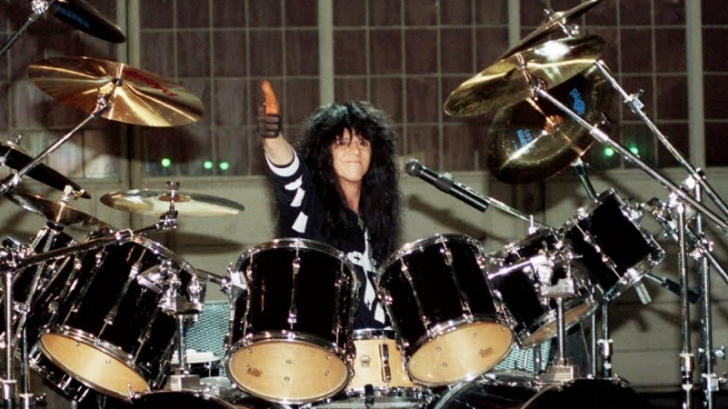In almost every band, there exists an unquestioned leader who takes charge, whether it be the lead singer or the guitar player. However, in bands like Fleetwood Mac and Rush, every member excelled in their role, often going above and beyond their duties. Although these bands are known for their raw talent and radio hits, attention is often drawn to those on stage who deliver exceptional performances on their respective instruments, while others fade into the background.
While these artists may not always be recognized for their classic riffs or solos, their contributions to each song are crucial, adding subtle nuances that keep listeners coming back for more. Despite their undeniable talent, they are sometimes viewed as expendable or must work harder to be heard live compared to the band leaders. While proficiency on an instrument is not the sole focus of rock music, the musicians mentioned in this list have certainly done their homework in delivering outstanding performances.
Joe Hahn – Linkin Park
Joe Hahn from Linkin Park elevated the DJ position in nu-metal, bringing crucial contributions to the band’s ability to innovate. He created glitchy soundscapes in the mix and surpassed the limitations of what DJs were expected to do, earning a Grammy for ‘Instrumental Performance.’ Hahn continued to innovate further, bringing electronic elements to the forefront on ‘A Thousand Suns.’
Eric Carr – KISS
Eric Carr was a standout member of KISS, known for his jazz-influenced background and strong rhythm. He propelled the band’s early records to success and contributed to some of their most powerful songs, such as the drums on Creatures of the Night. Offstage, he was known for his genuine and approachable personality, which set him apart from his larger-than-life bandmates. Although he passed away from cancer in 1991, his legacy lives on as a symbol of the goodwill that KISS represents.
Ray Toro – My Chemical Romance
My Chemical Romance’s Ray Toro was a rare gem in the pop-punk scene, providing guitar enthusiasts with a hero to idolize. Though the genre typically lacks an emphasis on shredding, Toro stood out as a fierce and innovative guitarist, constructing solos with layered harmonies and approaching the instrument like a lead singer. Even on albums like The Black Parade, Toro’s playing added an edge, evident in the standout runs on ‘Welcome to the Black Parade’ and playful sounds on ‘Dead!’. From classical guitar on their debut to shredding on ‘Na Na Na’, Toro found ways to incorporate his skills into any genre.
Mike Dirnt – Green Day
Dirnt of Green Day is often underrated as a bassist, but his playing style was vital to the band’s sound in the ’90s. He was responsible for creating rhythmic hooks, and his bass lines in songs like ‘Longview’ and ‘Welcome to Paradise’ were just as important as Armstrong’s guitar riffs. Even in more recent material, Dirnt occasionally lets the bass take center stage, proving that he’s practically a lead guitarist who picked up the wrong instrument.
Christine McVie – Fleetwood Mac
Fleetwood Mac’s fanbase often focuses on their romantic relationships, but Christine McVie was the true professional, having played with the band all the way back in their bluesy days with Peter Green. McVie’s voice was filled with the emotion of a woman far beyond her years, writing songs of heartache that made the listener weep in tender moments. There’s no one in the band who had a songwriting streak as perfect as McVie’s.
Les Claypool – Primus
Les Claypool’s bass playing in Primus is on another level, with his approach to the instrument almost resembling that of a lead guitarist. His influence from progressive rock legends like Chris Squire and Geddy Lee is evident, and his bass playing is practically a masterclass on every one of Primus’ albums. While their music might be wacky and eccentric, it’s clear that Claypool is a skilled musician who has elevated the bass to a whole new level.
Dave Grohl – Nirvana
Nirvana’s early vision was a dissonant punk outfit, but they needed someone behind the kit to hold their classics together. Dave Grohl, a miracle transplant from the DC hardcore scene, interpreted Cobain’s songwriting with intensity and served the song just right, laying back on “Something in the Way” or beating the life out of his drum set on “Territorial Pissings” or “Scentless Apprentice”. Grohl’s drum tracks are as essential to Nirvana’s songwriting as anything Cobain did.
Cliff Burton – Metallica
Cliff Burton’s impact on Metallica was significant, as he brought a level of musicality and knowledge of music theory to the band. Despite not being the biggest fan of metal, he contributed riffs that were more than just simple background to the guitar. Burton’s eclectic tastes, such as classical and Lynyrd Skynyrd, helped to shape Metallica’s sound and teach his bandmates, and his influence is still felt today. It’s tragic to think of what more he could have contributed had he not died in the 1986 bus crash.
Travis Barker – Blink-182
Travis Barker’s drumming style is a game-changer for pop-punk music. His intense and complex playing brings a ferocious energy to Blink-182’s songs, regardless of whether they are poppy or not. Barker’s talent for percussion is not limited to drums, with songs like ‘Always’ showcasing his fantastic stick work. He is also involved in Blink’s songwriting process, ensuring the rhythm flows well. Onstage, Barker is a force to be reckoned with, letting his drumming do the talking.
Neil Peart – Rush
Rush’s original sound was more in line with blues-influenced bands like Bad Company and Led Zeppelin. The band found their footing with the arrival of drummer Neil Peart, who brought a more prog rock approach to drumming and added sophisticated lyrics. Peart’s legacy is cemented as one of the greatest drummers the world has ever seen.

